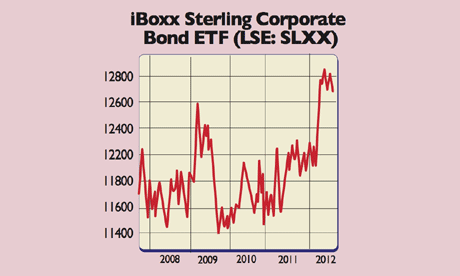Hidden risks in corporate bond ETFs
Corporate bond exchange-traded funds are in hot demand. But many investors are oblivious to a key risk. Paul Amery explains.

Get the latest financial news, insights and expert analysis from our award-winning MoneyWeek team, to help you understand what really matters when it comes to your finances.
You are now subscribed
Your newsletter sign-up was successful
Want to add more newsletters?

Twice daily
MoneyWeek
Get the latest financial news, insights and expert analysis from our award-winning MoneyWeek team, to help you understand what really matters when it comes to your finances.

Four times a week
Look After My Bills
Sign up to our free money-saving newsletter, filled with the latest news and expert advice to help you find the best tips and deals for managing your bills. Start saving today!
Exchange-traded funds (ETFs) tracking bond indices have certainly been in favour in 2012. Having attracted over $50bn in new money in the first eight months of the year, they have accounted for more than a third of all the global ETF market's inflows for this year and have already surpassed 2011's annual total (itself a record).
ETFs offering exposure to corporate bonds are in particular demand, as they provide one of the few ways of generating extra income in the current environment of near-zero official interest rates. But I worry that investors have missed a key risk.
Corporate bond ETFs can be split into two categories. First there are investment-grade ETFs, which hold bonds of a higher credit rating and thus offer a lower yield. Secondly there are high-yield ETFs that own riskier junk' bonds and offer higher yields. Both types have enjoyed an excellent recent run.
MoneyWeek
Subscribe to MoneyWeek today and get your first six magazine issues absolutely FREE

Sign up to Money Morning
Don't miss the latest investment and personal finances news, market analysis, plus money-saving tips with our free twice-daily newsletter
Don't miss the latest investment and personal finances news, market analysis, plus money-saving tips with our free twice-daily newsletter
The iShares' investment-grade iBoxx Sterling Corporate Bond ETF (LSE: SLXX) is up over 60% since the bottom of the bear market in March 2009. The iBoxx Euro High Yield (junk bond) ETF (LSE: IHYG) is up 20% in the last year. IHYG still offers a total yield of over 6%.

So why am I cautious? One reason is that the liquidity of a more traditional investment, such as a FTSE 100 ETF, and one buying corporate bonds, is fundamentally different. However bad the economy or the equity market gets, you're almost certain to be able to trade easily in and out of the likes of HSBC and BP (ie, leading members of the FTSE 100).
But trading in corporate bonds can easily come to a halt in tough times. That illiquidity is almost certainly worse than it was before 2007's financial crisis. That's because the banks that provide price quotations for corporate bonds can't hold large inventories any more due to regulatory rule changes.
iShares, the promoter of the most successful bond ETFs, argues that this doesn't matter as its funds are now big enough to provide investors with liquidity in the underlying bonds by themselves. But this is an untested theory and reminds me of reassurances made about some structured products that collapsed a few years back.
As long as central banks continue to prop up asset prices and suppress interest rates via QE, nothing drastic should happen to corporate-bond ETFs. But if markets crack, they are potentially riskier than many income-seeking investors realise.
Paul Amery edits www.indexuniverse.eu, the top source of news and analyses on Europe's ETF and index-fund market.
Get the latest financial news, insights and expert analysis from our award-winning MoneyWeek team, to help you understand what really matters when it comes to your finances.
Paul is a multi-award-winning journalist, currently an editor at New Money Review. He has contributed an array of money titles such as MoneyWeek, Financial Times, Financial News, The Times, Investment and Thomson Reuters. Paul is certified in investment management by CFA UK and he can speak more than five languages including English, French, Russian and Ukrainian. On MoneyWeek, Paul writes about funds such as ETFs and the stock market.
-
 Should you buy an active ETF?
Should you buy an active ETF?ETFs are often mischaracterised as passive products, but they can be a convenient way to add active management to your portfolio
-
 Power up your pension before 5 April – easy ways to save before the tax year end
Power up your pension before 5 April – easy ways to save before the tax year endWith the end of the tax year looming, pension savers currently have a window to review and maximise what’s going into their retirement funds – we look at how
